Character & Citizenship Education
Character and Citizenship Education (CCE) @ SMB
Character and Citizenship Education (CCE), comprising of National Education (NE), and Social and Emotional Learning (SEL), are integral to the holistic development of our students, leading to positive life outcomes. In Sembawang Secondary School, our CCE vision is civic-minded change-makers with a strong moral compass. This is in alignment to the national CCE goal, which is to inculcate values and build competencies in our students to be good future-ready individuals and useful citizens.
CCE 2021 Curriculum Frame
CCE 2021 provides an integrated approach to addressing our students’ development of values, character, social-emotional well-being, and citizenship dispositions in a coherent and holistic way. The CCE 2021 Curriculum Frame takes reference from the existing Framework for 21st Century Competencies and Student Outcomes and aims to enhance clarity on how the core values are linked to the social-emotional competencies, and how they are internalised and lived out by our students.
The curriculum content of CCE is based on the three big ideas of Identity, Relationships and Choices, and comprises the teaching and learning of core values and social-emotional competencies with a focus on developing a sense of purpose in our students.
The Curriculum Content Areas include
National Education (NE),
Sexuality Education (SEd),
Mental Health (MH),
Education and Career Guidance (ECG),
Cyber Wellness (CW) and
Family Education (FE).
There are several learning platforms where CCE is enacted with intentionality. These include CCE Lessons during curriculum time, Key Student Development Experiences (SDEs) beyond the classroom, school-based initiatives, teachable moments during other subject lessons, and learning opportunities beyond school. For the enactment of CCE to have sustainable impact on our students, a caring and enabling school environment is needed to support their dispositional development.
Key CCE Programmes:
Education and Career Guidance (ECG)
Cyberwellness(CW)
Vaues in Action (VIA)
Citizenship Education (CE)
Eco-Stewardship (ES)
1. Education and Career Guidance (ECG)
Key Message: To continually develop students’ interests, abilities and passion and teach them to contribute meaningfully to society through their future professions.
In Sembawang Secondary School, a holistic approach is adopted in planning and implementing our Education and Career Guidance (ECG) programme. As part of ECG development in our students, the school inspires all students to set goals and strongly encourages all graduating students to apply for tertiary courses via Early Admission Exercise (EAE) and Direct School Admission (DSA).
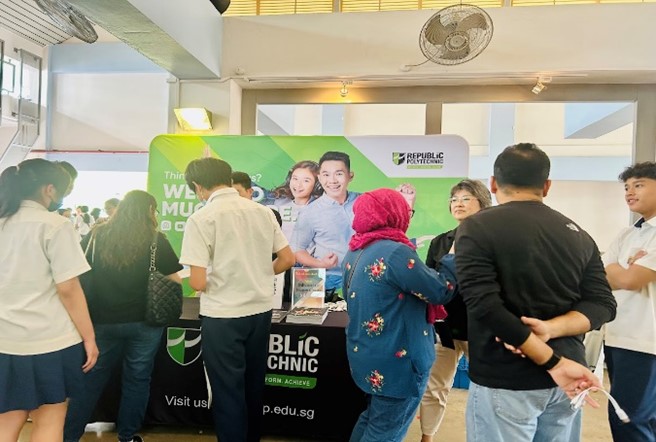
ECG Careers Fair in Sembawang Secondary School
Cyber Wellness(CW)
Key Message: Discerning and responsible digital users who are able to protect themselves and their well-being in the cyberspace.
The objectives of the various Cyber Wellness programmes are to provide students with enduring social-emotional skills and values and to foster their ability to be safe and responsible digital learners. In Sembawang Secondary School, we aim to achieve this by imparting knowledge, skills, values, and attitudes that promote self-respect, respect for others, and responsible use of technology. The goal is for students to exhibit positive peer influence and leverage technology for the betterment of the community.
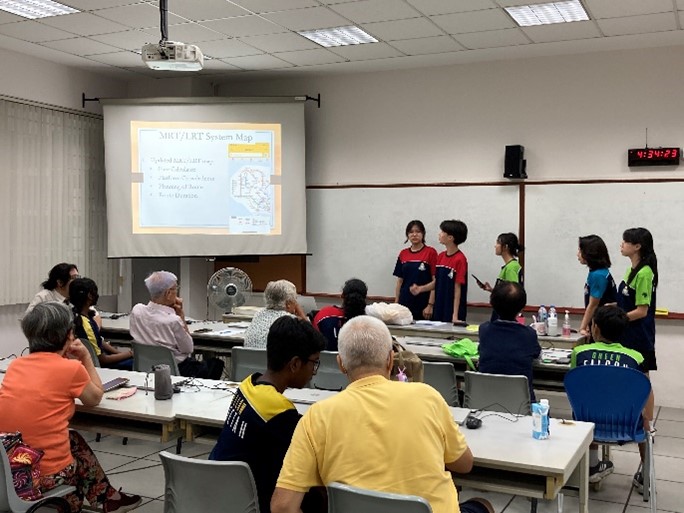
Cyber Wellness leaders educating the elderly in the community about the usage of digital apps and guiding them to navigate the cyber world safely through the Intergenerational Learning Program (ILP)
Values in Action (VIA)
Key Message: To nurture Leaders and Change Makers who demonstrate the school values to contribute meaningfully to the community
The focus of the Lower Secondary VIA programme is on environmental conservation while the focus of the Upper Secondary VIA programme is on community-based programmes (student-initiated) aimed at enhancing the lives of others.
The distinctive VIA programmes that were organised by the school include beach cleaning, designing recyclable bags and giving them to residents to promote environmental conservation, Student-initiated projects include preparing learning materials for children and community outreach to children centres and elderly homes.
Over their secondary school experience, our students have experienced many meaningful events that have brought about an impact to the environment and community, while achieving an “excellent” score in the service component of LEAPS 2.0.
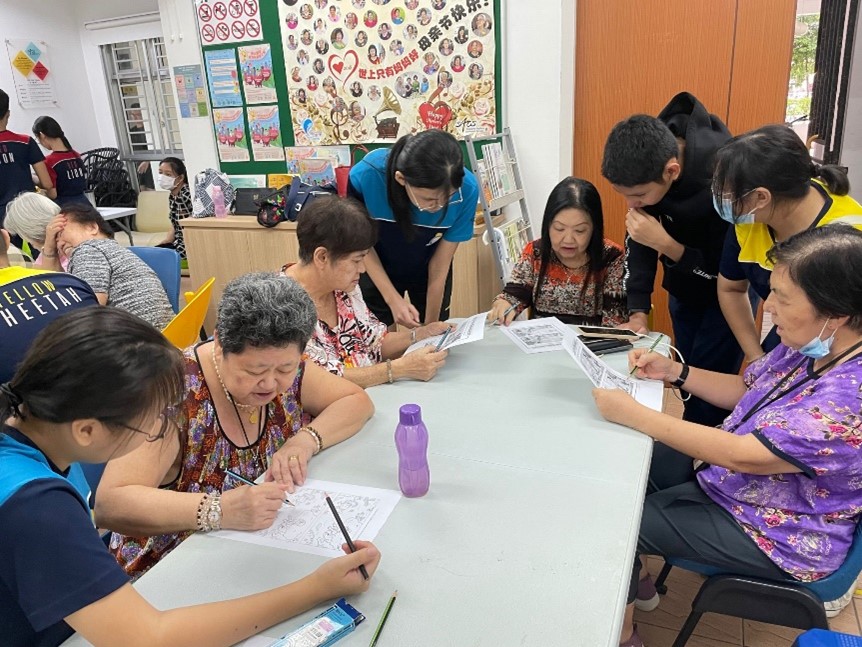
Outreach to the senior activities centre in collaboration with the Housing and Development Board (HDB)
4. Citizenship Education (CE)
Key Message: We believe our students and teachers are informed citizens who have a heart for the nation through cultivation of national cohesion, sense of belonging and confidence in the future.
The distinctive CE programmes that were organised by the school include Total Defence Day celebration, Racial Harmony Day celebration and National Day celebration. Through discussions of contemporary issues, customized class-based CCE lessons, citizenship experiences and celebration of these four annual events, students are guided in exploring and examining their Singapore identity.
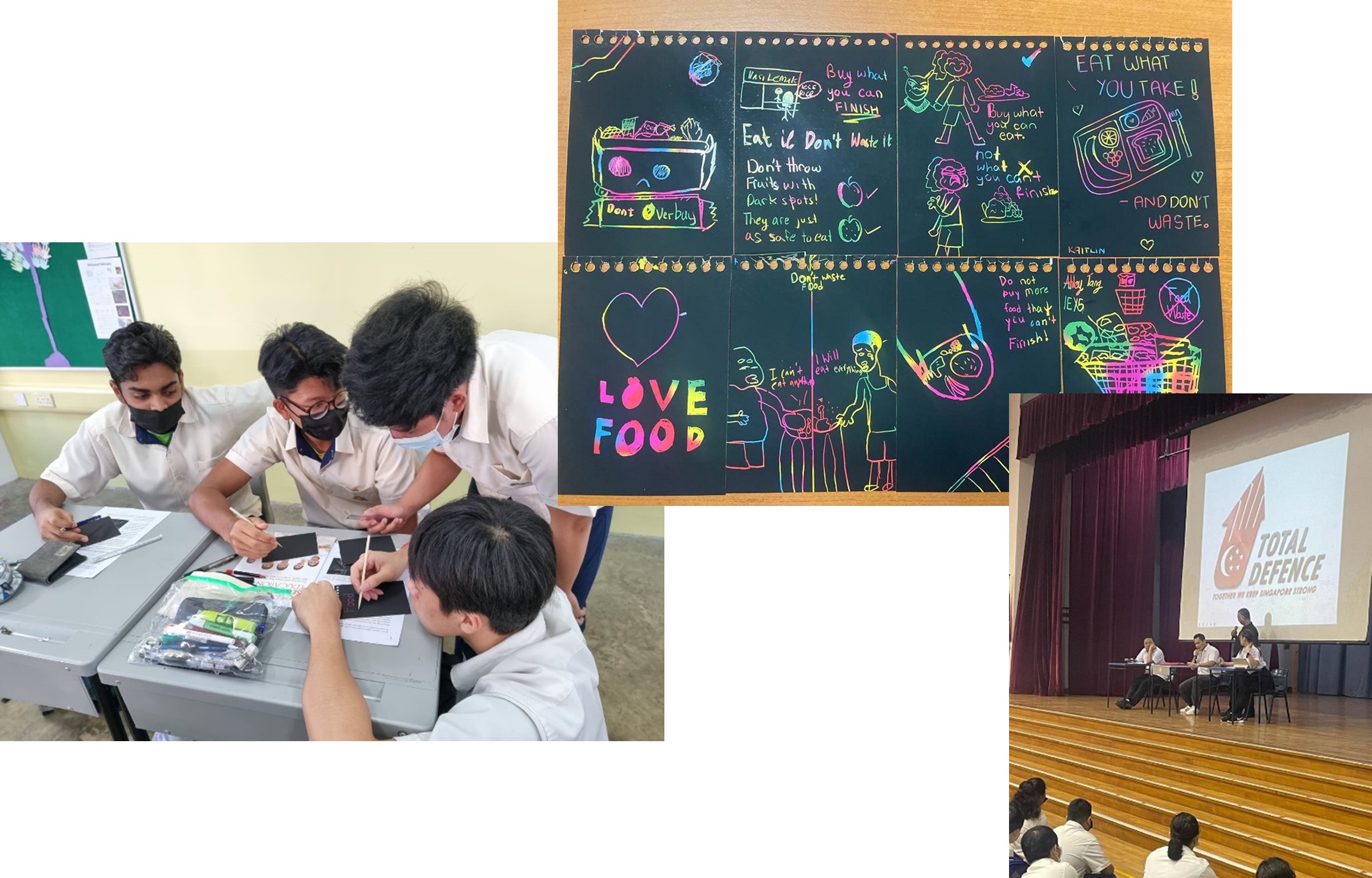
Students designing scratch cards to form a meaningful design related to Total Defence
5. Eco-Stewardship (ES)
Key Message: Responsible and caring individual who brings positive impact to the environment
The distinctive Environmental Conservation programmes that were organised by the school include:
School based recycling programme
Environmental awareness lessons/sharing conducted by Environmental Leaders on themes such as Recycling Right and Say Yes to Waste Less
Creating upcycled products from unwanted items
Swapaholic (students swap items they no longer need to reduce waste)
Through these programmes, students played an active role in ensuring environmental sustainability and instill actions in their daily lives to safeguard our planet.
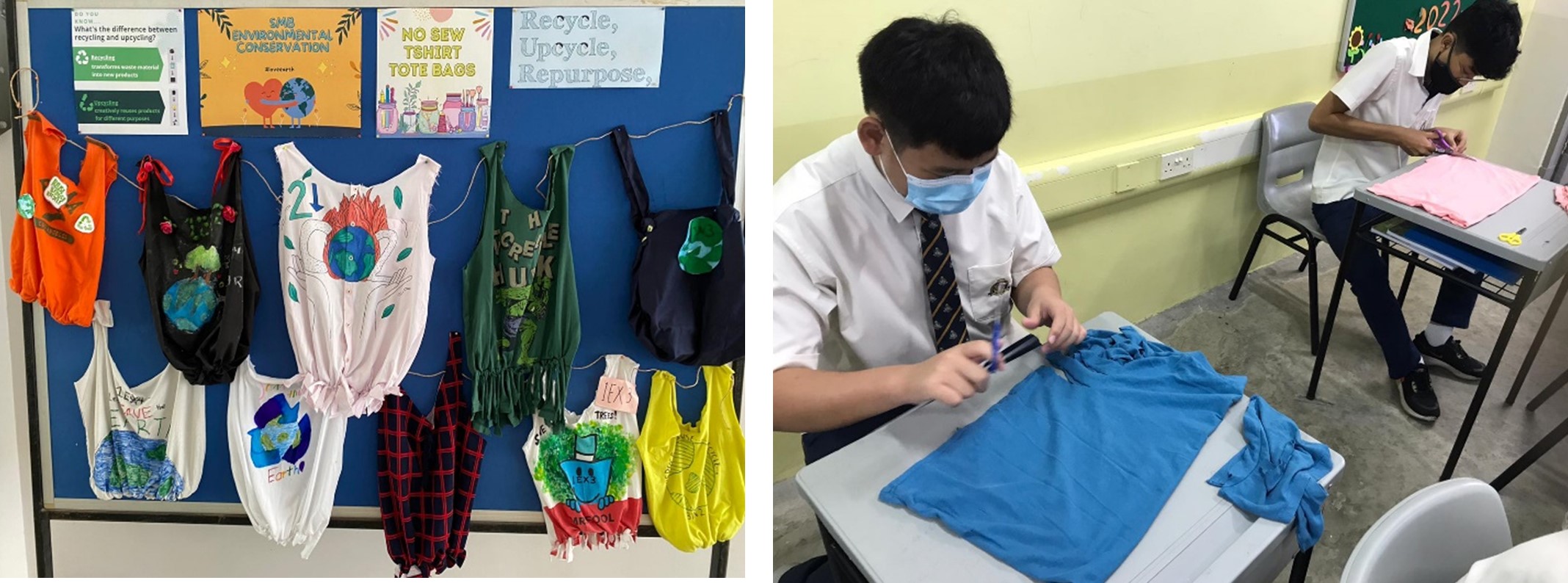
Upcycling project to reuse unwanted clothes as tote bags

